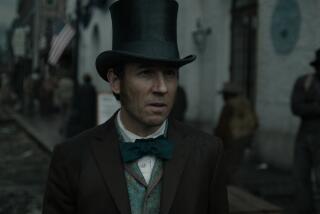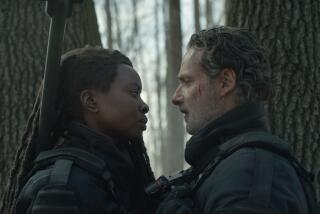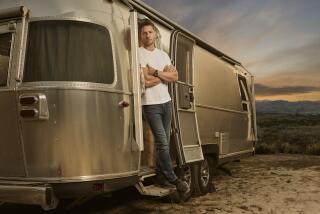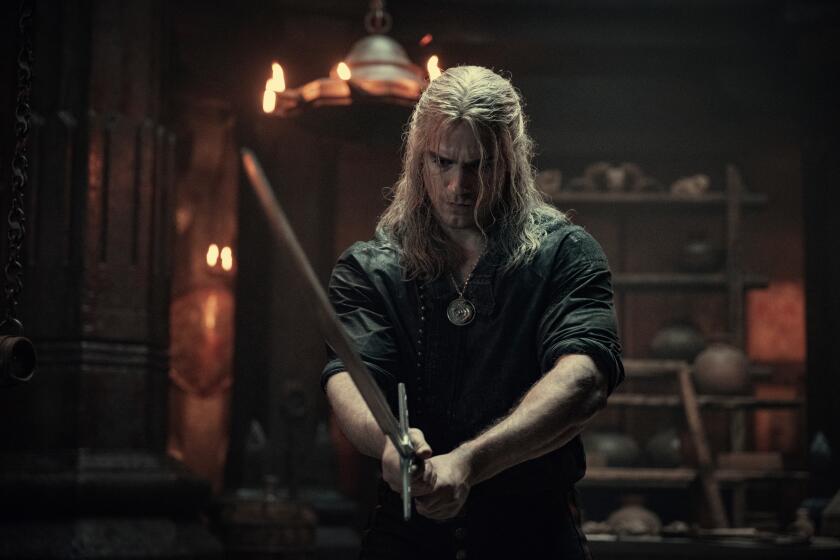‘The Walking Dead’: David Morrissey on the Governor and Elvis
David Morrissey has cast a wide shadow over “The Walking Dead” in its third season as the much anticipated villainous leader known as the Governor.
While the character is a sinister presence with a black eye patch and a closet full of zombie heads, Morrissey in real life is upbeat and chatty as he talks from rainy London, which is his home.
In Sunday’s episode, “Arrow in the Door,” Morrissey’s Governor finally had a sit-down with his arch nemesis, Rick, played by Andrew Lincoln. Despite an attempt to come to some kind of peace, it’s apparent that war is inevitable as the “Walking Dead” heads toward its season finale in three weeks.
PHOTOS: Celebrity portraits by The Times
Did you get together with Andrew Lincoln to rehearse your big confrontation scene with him in “Arrow in the Door”?
We didn’t rehearse it, no. What’s interesting for me about “The Walking Dead” is that I came to the show as a fan and I’ve known Andrew for a long time. Now I’m on the show and I never see Andrew. I hadn’t seen him for a long time because our characters never work with each other. So then we get to this episode where it’s the first time we’ve worked together and on the days we were shooting, we didn’t really hang out or sit down for cup a coffee. We kept our distance while we were filming. Which was fine. I think we needed to do that. We guarded our own space. Then we tried to see what happened within that dance with each other. The thing about filming a scene like that is time is not on your side. It’s not like doing a play or a movie where you’ve got a few weeks to talk about it and what the beats are. You really have to throw into it. We were making choices, not quickly or broadly, we’ve both thought about our characters and what we wanted to do. But there was very little discussion around it as a scene. We were just reacting to each other.
The western imagery was very distinct in this episode. Rick is the sheriff and you’re the man in black.
There’s a sense of guns on the hips in that world. When I drive around, I think if suddenly there was a petrol crisis, we’d be riding horses around. There’s a sense of a westernization already in the culture. Carl wears a sort of cowboy hat. It already has that going for it. The grain store. The whiskey. I always think when you see Daryl on his motorbike, he could be riding into town on a stallion. We’re never a million miles away from that genre.
How are you spending your time off from the show?
At first I was fine, but now I’m a little bit twitchy. I want to go back to work, really. At first I came home and laid down in a bed for a month, napping. Then we went on that whole thing of promoting the show. It was great. Now the second half of the season is on and I’ve had enough of being off. I want to go back to work.
So have you seen any new scripts yet?
I can’t say whether I’m coming back to the show. That’s the other thing. I say I’m ready to go back to work, but any work, really. I can’t say whether I’m in Season 4 or not. You’ll have to have to wait until the end of Episode 16 to see if I actually get through Season 3.
It’s always a tricky dance when promoting a heavily serialized show like this to speak freely without giving anything away.
I know. And you feel terribly rude. But the fans are interesting, because the fans don’t want to know. They approach you and they talk, but when you start talking about the show, they say, “Don’t tell me what happens, don’t tell me what happens!” I think that’s what’s interesting with the show and with television in general now, people want that live event. They want to be able to sit there and see it Sunday night and know that everybody else is watching it at the same time and having that similar experience. I think “The Walking Dead” is a prime example of that. People getting it right there on the tube all at the same time. It’s fantastic.
Have you ever slipped up in your interactions with fans and said too much?
I have a litte bit, yeah. But they’ve been good about correcting me sometimes. I slip up sometimes because the show comes out in America on a Sunday night but it doesn’t come out in the UK until Friday. Sometimes that can be a little bit tricky, knowing who’s seen what.
Is this the first time you’ve experienced the whole phenomenon with spoilers and secrets?
I had that majorly with “Doctor Who.” What happened in “Doctor Who,” I filmed the Christmas special. We filmed it in February. It was called “The Next Doctor” and I played the Next Doctor. I played a man who believed he was Doctor Who. We filmed it, it was great, it was a lovely episode to film. But at the end of filming, David Tennant announced he was going to stop being Doctor Who. And Russell T. Davies, who relaunched “Doctor Who,” came to me and said, “Would you mind if we leaked that the next Doctor Who is going to be you and you’ll be coming out in the Christmas special?” I said that’s great. He said “Don’t tell anyone.” I said I can tell my kids, surely. He said “No, you can’t tell anyone. They’ll tell someone else.” For a good nine months people would say to them, “Your dad is gong to be Doctor Who.” And they’d come to me, “What? What? Dad, are you going to be Doctor Who?” I couldn’t even tell them. It was really weird. It was the ultimate spoiler to be sitting there on Christmas Day, watching the special and they turn to me and say, “You’re not the next Doctor, are you?” And I said, “I never said I was!” That was a real killer.
You made it up to your son by being in “The Walking Dead.”
“Walking Dead” and “Breaking Bad” are his two favorite shows. And “Dexter.” He’s a big fan of “Dexter.” So I was in L.A. and I called him and said I have an interview tomorrow for “The Walking Dead.” And he said “What? What?” Then when I told him I got it, he was over the moon. But he’s able to detach from the person I play. He’s always been able to do that. I don’t think he believes that at any moment I’m going to put on an eye patch and have a bunch of zombie heads in a fish tank. His generation is interesting, because they watch television like I used to listen to albums. They watch it again and again and again and quote it back to each other and it invades their language. That’s sort of how I used to listen to albums. I’d get an album and I’d play it endlessly until it infused my conversation with everybody. That’s sort of how they’re watching television and taking ownership of television in that way. Even shows that aren’t cult shows become a cult to those teenagers. I think it’s great for the industry.
Glen Mazzara has said the Governor sees himself as a player on a larger stage. How does the Governor see himself? And does that differ from how you see him?
I think the Governor is playing a Governor himself. I read the books “The Rise of the Governor” and “The Road to Woodbury” and I wanted the writers to explore that side of the character. Woodbury is a success story. People can leave their door open. In this world that’s an unheard of advantage and privilege. That feeds his ego. We all know that power can have a corrupting influence on people. There’s a sense during Season 3 the Governor could have slipped to the side of the angels if he wanted to. He could be a good force for change. Things happened and he listened to the darker side of himself, certainly when his daughter is taken away from him so brutally. And his daughter was his humanity. She embodied his humanity. She was his gateway to the past. She was filled with happy memories. She was the best of him. Once she’s taken away form him in a cruel and brutal way in front of his eyes, that’s what tips him into a darker brutal person, out for seeking revenge. I think it’s a very wonderful, human person, a person touched by great humanity, who wouldn’t feel outrage and revenge and sense of darkness if that had happened to them. It takes a special person to have their child taken from them like that, and the Governor doesn’t have this specialness about him. It psychotically tips him somewhere else. It really does rewire him. If you put him on a psychiatrist’s couch, he becomes a vengeful person. It’s a brutal world and he’s brutalizing the people around him. I think you see the difference between him and Rick in Season 2. Rick spent most of Season 2 debating whether he should kill someone. You get to the open of Season 3, he gets into that prison and he kills someone right off the bat. He too has been brutalized by this world. That’s where I see the Governor. He’s a victim of his time, rather than inherently a bad person.
While creating the role, I read that you looked to Bill Clinton for inspiration?
Clinton was an accent thing. I listened to him. I looked at a lot of American leaders: Bush, Reagan. I looked at Tony Blair, Gordon Brown. I’ve played Gordon Brown. Leadership is a very interesting thing to research for me. The political machine and how it works and how it corrupts people. And also leaders in cults. Looking at how people worked in small communities and led small communities. I read things like Tim O’Brien’s book “The Things They Carried.” Looking at brutalized worlds -- he wrote this about Vietnam. Tim O’Brien is a good man, full of humanity, but he did terrible things in that world, things that he has to remember when he looks into his children’s eyes. That type of complexity is good people doing bad things. Nobody is all good and nobody is all bad. You have to look at people’s motivations. I looked at the great plague in the 1300s and how communities were destroyed and devastated by this plague and fear. It’s all driven by fear and the Governor is very good at manipulating his populace by fear and the idea of fear. They’re coming for us and I’m the guy who can save you. You don’t have to go a million miles to find people saying that message all the time.
I heard you create a music playlist for the characters you play. What’s on your playlist for the Governor?
There’s a band called 16 Horsepower. The Cave Singers. There’s some Stones in there. There’s a great guy called Terry Reid. Terry was going to be Robert Plant when Zeppelin was looking for a singer, he was going to be the guy. But then he went AWOL and they got Plant. He’s got this great British rock voice. My favorite bands are the Small Faces and the Faces. They’re both in there. Rod Stewart when he’s with the Faces and when he’s on his own. There’s a great guy called Bonnie Prince Billy.
Is it the emotion of the sound that appeals to you or is there an intellectual reason why you chose those acts?
It depends. With “The Walking Dead,” it’s a mood tape that keeps me in character. When you’re on a film set, everyone’s got work to do and sometimes it’s a very noisy atmosphere, but you can’t go off to your trailer, you have to be there. So it’s a way of isolating myself whilst all that work is going on around me. And then people can wave at me when we’re ready to go. It’s to keep me in the place I want to be. Sometimes I work with a playlist that would be the character’s favorite playlist, so it’s not for me to get into a mood, it’s for the character. I’ve made playlists of the most appalling music and tortured myself by listening to it, but it gets me into the place I need to be. I also use photographs to create a mood board of images that I want to help create the character. They’re very collage-like. Given the schedule that we work, which is so fast and furious that sometimes I need a music or the images to tip me into a different way of thinking or get me into the mood I need to be in.
What are the Governor’s images?
Very mournful. There’s a British war photographer named Don McCullin. He’s an amazing war photographer, he was in Vietnam. And some of those iconic images from Vietnam and Iraq are from him. I used those. There’s quite a few apocalyptic images. I also used good images of American family life, of what [the Governor’s] life was like before. Penny and his wife and the type of work he would have, the type of car he would drive. Good Middle America things. Things I saw in Georgia all the time. He was a happy, married man who had a middle-income job and he was doing OK. So it’s important for me to get images of that life as well. And then the darker side. Destruction. Hell on earth.
How did you find working in Georgia?
I felt immediately at home. The way people interacted with me on the street or in the cafes was very friendly. It was a very chatty, open atmosphere. Particularly in Senoia, where we’re filming. But then I went to Savannah and Charleston, [S.C.], which are just beautiful places to visit. Architecturally very interesting. It’s old America, a different type of world. Sherman didn’t get there. Savannah is amazing with the town squares and the hanging moss and the French Colonial houses. It’s brutally romantic. Then I went to Graceland. It was a huge ambition of mine ever since I was a kid.
Was it a religious experience?
I wouldn’t go that far, but I bought some Elvis shirts which my kids made me swear I’ll never wear in public. I went to that gift shop and I spent a fortune. That’s all I’m saying. I didn’t buy any capes or all-in-one suits from the Vegas period. I didn’t buy the all-leather Elvis suit, although I nearly did. I bought some Hawaiian shirts and a couple of jackets. You might see them one day.
As a horror fan, are there any particular works which have stuck with you?
Yeah, “The Wicker Man” is a great one. It’s a very odd, psychological breakdown of a movie. It’s not a horror film where Dracula is coming out of his coffin or Frankenstein’s monster. It’s very much the story of a deeply religious man, a man of authority, a policeman and he ends up in a pagan place and how he encounters that community. I often come back to that film and how the sensory nature of it plays on me is brilliant. It’s a great film. I remember watching it late one night as a kid and it having a troubling effect on me. Recently, the film I‘ve seen again this year, the “Berberian Sound Studio.” It’s a work of genius. It’s about a sound editor who goes to work in Italy in the ‘70s on a horror film and it’s having a deeply troubling effect on him. It’s great psychological drama. Films like “Don’t Look Now” are the type of horror genre I find to be brilliant. It gets you at the very core of your being.
ALSO:
‘Walking Dead’: Rick prepares to negotiate with the Governor
‘Walking Dead’: Glen Mazzara talks ‘long-term’ plan for The Governor
‘Oz the Great and Powerful’ and ‘Walking Dead’? Nicotero is connection
PHOTOS, VIDEOS & MORE:
PHOTOS: Behind the scenes of ‘Downton Abbey’
VIDEO: Winter TV preview
PHOTOS: Violence in TV shows
More to Read
The complete guide to home viewing
Get Screen Gab for everything about the TV shows and streaming movies everyone’s talking about.
You may occasionally receive promotional content from the Los Angeles Times.







